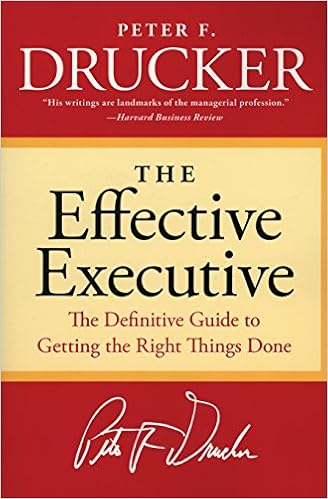 The Effective Executive: The Definitive Guide to Getting the Right Things Done (Harperbusiness Essentials): Peter F. Drucker: 8601420130388: Amazon.com: Books
The book has seven chapters:
The Effective Executive: The Definitive Guide to Getting the Right Things Done (Harperbusiness Essentials): Peter F. Drucker: 8601420130388: Amazon.com: Books
The book has seven chapters:
- Effectiveness Can Be Learnt
- Know Thy Time
- What Can I Contribute?
- Making Strength Productive
- First Things First
- The Elements of Decision Making
- Effective Decisions
How to be effective: THE EFFECTIVE EXECUTIVE by Peter Drucker | Core Message - YouTube
1 page PDF summary @
Lozeron Academy
- To be effective is to be selective with your time.
- Ask yourself: What contribution can I make? ->
"To focus on contribution is to focus on effectiveness."
- Know Thy Strengths:
Maximizing your strengths maximizes your contribution.
- Don't know your strengths?
Volunteer for new roles and get feedback on your performance.
- Know Thy Time:
Maximizing your time maximizes your contribution.
- Don't know your time? Keep a time log
and after a month review your time statement to determine
- what you need to stop doing and
- what you need offload.
- Ultimate Goal:
Do what you do best, and stop doing or give away the rest.
by Peter F. Drucker
"What made (an executive) effective is that they followed the same eight practices:
- They asked, “What needs to be done?”
- They asked, “What is right for the enterprise?”
- They developed action plans.
- They took responsibility for decisions.
- They took responsibility for communicating.
- They were focused on opportunities rather than problems.
- They ran productive meetings.
- They thought and said “we” rather than “I.”
Steps to effectiveness:
- Recording where the time goes
- Focus your vision on contribution
- Make your strengths productive and focus on using them
- Prioritize the most important things first, not necessarily the most urgent
- Take rational action
 Amazon.com: ASUS Chromebook C202SA-YS02 11.6" Ruggedized and Water Resistant Design with 180 Degree (Intel Celeron 4 GB, 16GB eMMC, Dark Blue, Silver): Computers & Accessories
Amazon.com: ASUS Chromebook C202SA-YS02 11.6" Ruggedized and Water Resistant Design with 180 Degree (Intel Celeron 4 GB, 16GB eMMC, Dark Blue, Silver): Computers & Accessories